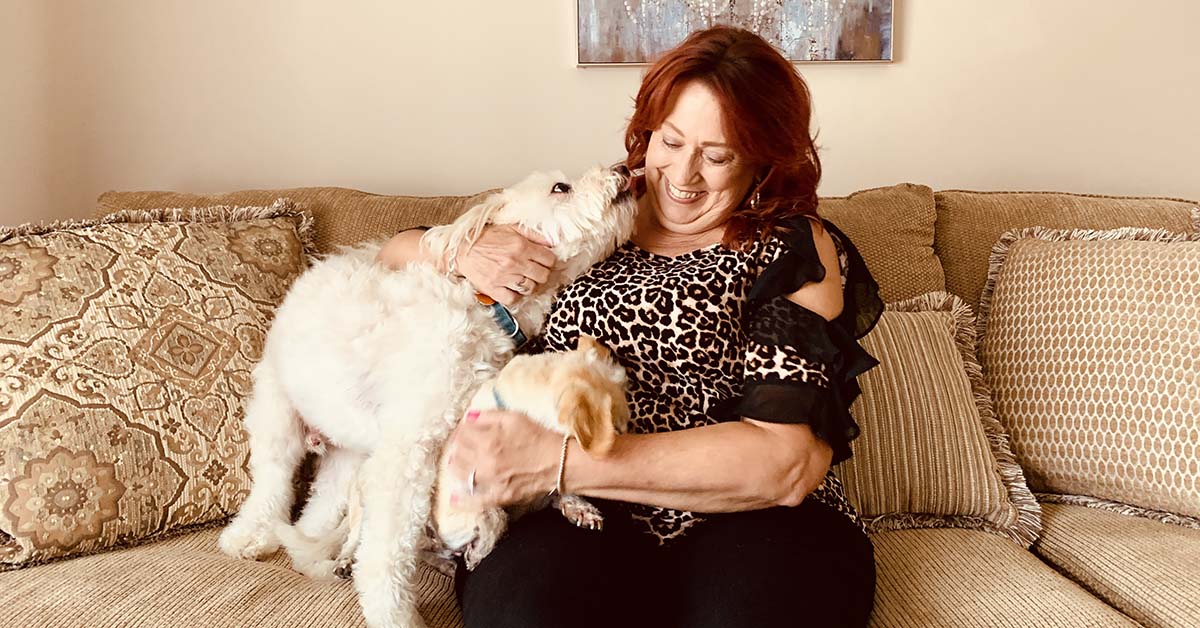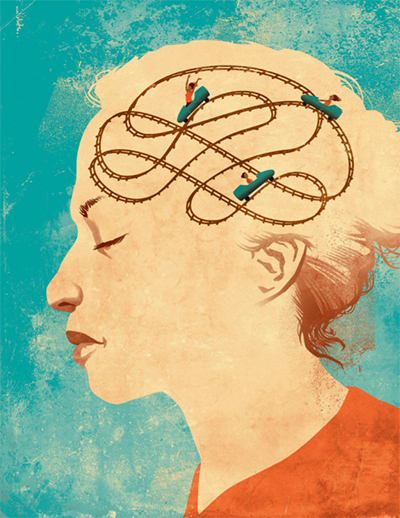
Riding the Caregiver Roller Coaster
Being a Cancer Caregiver Offers Challenges, Rewards
-
By Marian Dennis
Originally published in Forward – Summer/Fall 2020
Being a caregiver for a loved one with cancer can be frightening and heart-wrenching, but it can also be rewarding. In many ways, it’s a job as complicated as the disease itself.
“I always tell caregivers, it’s like a roller coaster and the caregiver rides that roller coaster with the patient. They’re just in a different seat,” said Lisa Etkins, MSS, LCSW, OSW-C, a social worker at Fox Chase Cancer Center. “The emotional impact of being in a raw place with the patient, going through a challenging time and being present for them, can make people’s relationship much more intimate or difficult.”
The caregiver’s role can be a hard one to navigate. In many cases, they take on the role for someone in their life who is close to them, which can make the job that much more challenging.
One such person is Jeannie Watson, 58, of Glendora, New Jersey. She took care of her husband Bill on and off for 20 years. They had been to numerous doctors about his condition and had gotten no real answers. It wasn’t until 10 years into caring for him that doctors could finally tell her that he had non-Hodgkin lymphoma.
-
There’s always doubt in your mind…there’s a lot of mental games that go on in your head, and I don’t think they go away after your loved one passes.”
RICHARD LAMB, CANCER CAREGIVER -
She recalled that some of the most painful parts of this journey were to be expected, such as watching someone she loved deal with more and more challenges to their health and happiness. “I remember when he couldn’t go in the ocean anymore because it was too rough. That was what he loved, swimming in the ocean.”
Watson responded to this challenge and others as she always did, by giving all she could to caring for her husband. “We worked around it and did a few years going away where there were calmer waters in places like Mexico,” she said.
Focusing completely on his care was one of the most important things she ever did, but that didn’t mean she didn’t face her own challenges. Among many of her memories, Watson recalled being awake around the clock and days where she felt so tired she would sleep in her car in the emergency room parking lot. “There were days I didn’t think I could survive. I would go from 7 a.m. to 1 a.m. because I had to, and I was always on edge,” Watson said. “I was the last one to be taken care of, and I didn’t think about it then.”
Prioritizing Self-Care
Putting personal well-being on the back burner is common among caregivers. Paula Finestone, PhD, a clinical psychologist in the Section of Psychiatry at Fox Chase, said caregivers’ needs often get neglected for a variety of reasons.
“Often the caregiver fills all the roles, so it can be difficult to ask for help. People in the community don’t know how to help and don’t want to add to the burden. They may also have their own fears and anxiety about cancer,” said Finestone.
That issue was echoed by Richard Lamb, an advisor on the Patient Family Advisory Council for Fox Chase. Lamb cared for his wife for several years after she was diagnosed with gastrointestinal stromal tumors in 2001. He noted that in addition to the possibility of friends and neighbors pulling back from the situation, the patient’s feelings about socializing may change as well, which ultimately affects the caregiver.

Caregivers often take on the role for someone in their life who is close to them, which can make the job that much more challenging. “As a caregiver, you have to accept the role. You’re not a spouse, parent, or close friend anymore. It’s a different mindset. Your social life changes drastically. Sometimes your spouse doesn’t want to do something even if they’re healthy enough to do it, so it’s an adjustment,” said Lamb.
That adjustment sometimes requires a different kind of support.
“We often hear from partners that they feel a loss of control or are more stressed than the patient because the patients are the ones who are doing the treatments and going to appointments. Partners sometimes can feel left out and helpless because they don’t have a chance to be heard from,” said Jennifer Barsky Reese, PhD, a licensed psychologist and associate professor in the Cancer Prevention and Control Program at Fox Chase. Reese conducts research on how couples cope after breast cancer diagnosis and treatment.
Bringing Out the Best
Caring for a loved one, however, doesn’t begin and end with only the challenges. In many cases, according to Reese, couples have reported feeling closer to each other as they work together through a cancer diagnosis. Such was the case for Lamb.
“We grew much closer as a couple. We had always been very good friends, but we became even more emotionally closer. It helped us as she dealt with her cancer,” said Lamb. Additionally, he found a greater appreciation for things that can sometimes be taken for granted.
-
You can’t handle it all yourself. Whether it’s through your family, church, or friends, if you don’t get the help you ask for, turn to someone else.”
JEANNIE WATSON, CANCER CAREGIVER -
“The fun things we did during her last two years became much more joyful. We even did some things the last two or three months with the family, and those are very intense memories that the family and I will always cherish. You appreciate things a whole lot more,” he said.
Watson had similar feelings. “I never knew how strong I was until I handled that. Sometimes I think to myself, ‘Would this have been you your whole life, regardless, or is this you because of what you went through?’ In some ways it’s been positive for me,” she said.
Watson copes by knowing that she gave her husband everything she could, and even though she misses him every day, she believes her husband sent her the man she is with today. “Even when you think it’s over, it’s not over. It’s just beginning,” she said.
Coping as a Caregiver
Caregivers experience many ups and downs, but there are resources available to help them and professionals have a number of recommendations to assist with the process. One of the most important points healthcare professionals and experienced caregivers stress is paying attention to the health of the caregiver.
“One very important thing is that self-care piece. I encourage caregivers to spread the wealth in terms of caregiving. It’s also beneficial for a patient to have interaction with several people, not just one person,” said Finestone.
She also recommends several strategies for “mindfulness,” a form of meditation. The general principle behind mindfulness is that while an individual is focusing on one thing, like their pattern of breathing, they can begin to feel calmer.
“I want to make that connection between breathing and relaxation, so when they are in that intense situation about a diagnosis and the anxiety creeps up, or they’re butting heads with the patient, I want them to be able to go to that breath and have a moment to think about how to respond,” said Finestone.
-
I always tell caregivers, it’s like a roller coaster and the caregiver rides that roller coaster with the patient. They’re just in a different seat.”
LISA ETKINS, SOCIAL WORKER -
Another thing to remember about being a caregiver is that it can also be a stepping stone toward giving back, said Finestone. “One of the perks of caregiving is that an individual reprioritizes. They may realize that working too many hours is not beneficial. They start spending the rest of those hours doing something they enjoy,” she said.
One of the many ways individuals can reprioritize is by joining the Patient and Family Advisory Council, which helps make positive changes at Fox Chase by providing patient and family perspective. Both Watson and Lamb have taken part in this council.
And both said the best advice they can give to caregivers is to remain educated about care and stay healthy by seeking the right support. “I would say stay knowledgeable and be part of a trustworthy support group. Anticipate the patient’s needs, be efficient and organized. It will help keep you calm and under control, which your loved one needs,” said Lamb.
“You can’t handle it all yourself,” said Watson. “Whether it’s through your family, church, or friends, if you don’t get the help you ask for, turn to someone else. I got through what I did because the outside support I had was fabulous, especially from my children.”
Illustration by Sam Ward
Photo by Nina Hien

